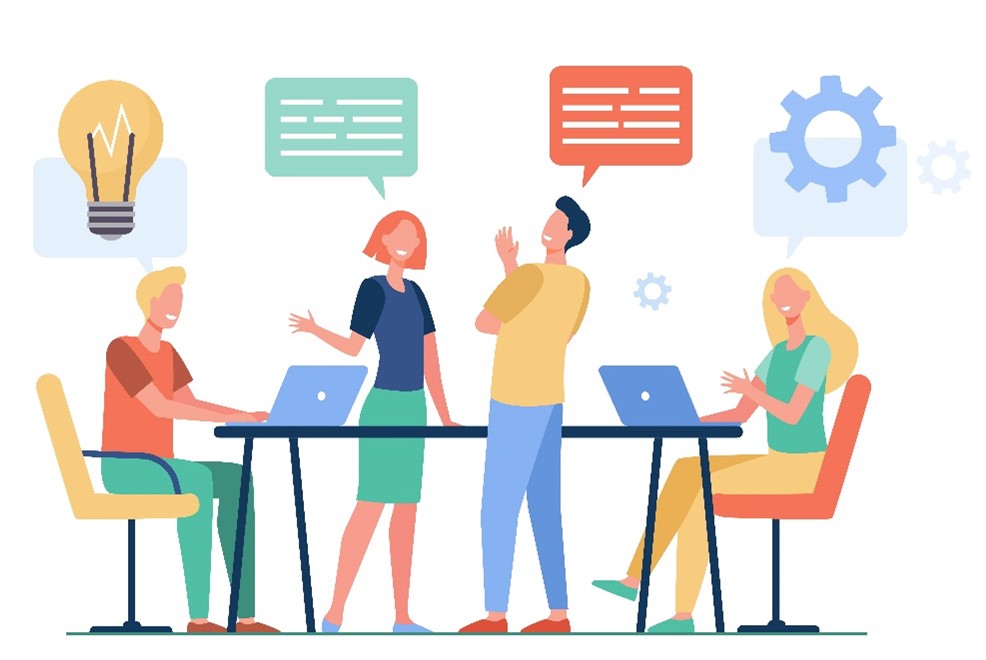Teachers need to pay great attention to their vocal communication in the live online tutoring setting if they want to be successful and efficient. Students may respond in a variety of ways to each word, therefore teachers should be more deliberate with their word choice and delivery. What is said and how it is stated matter equally in live online classroom. The tutor's ability to effectively deliver a message to their students depends on their careful selection of words and consideration of their tone. If proper verbal communication requirements aren’t followed, it might cause tension between the teacher and their students, which can have negative effect on their relationship.
 Source: https://www.freepik.com/free-vector/business-team-planning-working-process-flat-vector-illustration-cartoon-colleagues-talking-sharing-thoughts-smiling-company-office-teamwork-workflow-concept_10606194.htm#query=business-team-planning-working-process-flat-vector-illustration-cartoon-colleagues-talking-sharing-thoughts-smiling-company-office-teamwork-workflow-concept&position=0&from_view=search&track=sph
Source: https://www.freepik.com/free-vector/business-team-planning-working-process-flat-vector-illustration-cartoon-colleagues-talking-sharing-thoughts-smiling-company-office-teamwork-workflow-concept_10606194.htm#query=business-team-planning-working-process-flat-vector-illustration-cartoon-colleagues-talking-sharing-thoughts-smiling-company-office-teamwork-workflow-concept&position=0&from_view=search&track=sph
You can use the following steps to help you improve and boost your verbal communication skills in an online environment. Even more, those advises are equally applicable for communication in a real environment as well:
1. Allow time for pauses
People don't like silence, especially when they're online, but pausing before answering a question can help you give a better answer. By giving yourself time to think, you can organize your ideas into a clear, concise statement. If you feel rushed to answer, that will show in how you answer, and your message might not come out the way you meant it to. Also, if you ask a student a question and they don't answer right away, don't feel like you have to jump in and fill the silence. The person will appreciate that you gave them time to think about their answer instead of stopping them in the middle of their thoughts.
2. Don’t forget to listen
Teachers frequently fail to listen to their students and connect with them because they are preoccupied with giving the learning content, which is a challenge by itself in a virtual classroom. But you should always remember that listening attentively provides invaluable insight. That may be a huge assistance in terms of structuring the material covered in class. Most importantly, however, it's a great method to build rapport with pupils and inspire them to do their best.
3. Adjust your tone
When you talk to someone, your tone is very important, and how you use it can change how they interact with you. A smile and a friendly, warm tone make a good impression. Speaking in a flat or monotone way, on the other hand, can make you seem uninterested, which can make the students doze off. Also, try to change your tone and use inflection to emphasize important points. This method is a simple way to get your audience's attention.
4. Be concise
When you speak, being brief makes your message easier to understand and helps you get your main points across faster. Before you speak, think about how you can say what you want to say so that it is clear and in as few words as possible. When you write or speak, don't use complicated words and sentences or include information that isn't important.
5. Be mindful of your body language
While it is a nonverbal mode of communication, body language may nevertheless have a great impact on how you convey your messages. Maintaining eye contact and a calm demeanor are two of the best ways to show assurance via body language. In addition to words, you may utilize gestures and facial expressions to effectively convey your message and capture the attention of your students.
In this online blog article you may find useful information about successful strategies for communicating effectively with students across learning environments. Besides offering insight on what exactly does effective educator-student communication look like, particularly in a virtual space, it also provides additional resources and research-based practices that educators can use in any learning setting.
The effectiveness of education is significantly supported by the verbal and nonverbal communication of teachers. Teachers who are aware of the significance of this communication will be able to develop their skills as educators and provide engaging lessons. Teachers should put additional effort into this by always looking for methods to enhance and raise their verbal and nonverbal communication skills. Although it may seem very time and effort consuming, in a long-term prospect it will result to be beneficial for everyone involved in the learning process, regardless if it is online or in-person.